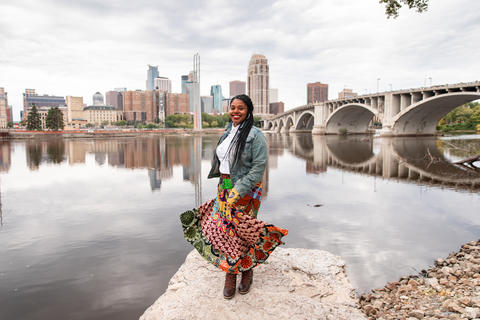
Love and Resilience

“I’ve always had a leadership instinct,” says Selah Michele, explaining how, even as a young girl growing up in North Minneapolis, she sought out opportunities to lead and mentor while participating in Minneapolis Park and Recreation programming and other activities. Currently focused on running her own business, Selah Michele Wellness, a holistic healing practice focused on energizing people in her community around holistic health and well-being, Michele is best known for her work as a community organizer, trainer, trauma responder, and advocate for social justice.
“I believe deeply in my community and our ability to come up with joyful and loving solutions to the problems we face,” she says. “We have a lot of challenges to deal with, but we are also powerful. I believe most people are really looking for a sense of belonging and support. Our resistence to systemic violence must be rooted in love and resilience.”
Among the many places Michele has joined with in support of her community, in good times and bad, is the University of Minnesota ‘s Robert J. John Urban Research and Outreach-Engagement Center, UROC. In addition to participating in community conversations on trauma and other topics, she has also shown her art in UROC’s gallery, studied puppetry, and gone through the University of Minnesota Extension’s Community Garden Training Program.
“UROC has been a pinnacle space for community gathering as well as building support for many local artists, including me,” she says, explaining that UROC has played an important role in encouraging community dialogue on some of North Minneapolis’ challenges and victories.
A tireless advocate for equity social justice, Michele has been a founder and/or member of many community-focused organizations over the years. As a founding member, consultant and trainer with Sustainable Progress Through Engaging Active Citizens (SPEAC), an intensive community organizer training and neighborhood leadership development program at Hope Community, she has prepared many others to take on leadership, action and healing roles.
And as a trained crisis responder, Michele was a member of the former Diaspora Healers Network, a black/African diaspora healers collective. And she is currently an active member of the Soul Medic Community Care Institute, which provide triage-style, trauma-informed wellness support in times of community crisis. Unfortunately, the several years have been busy ones for Michele, who along with other crisis responders, have spent long hours supporting community members as they cope with tragedies, including the killing of Jamar Clark by two Minneapolis police officers in 2015, as well as the subsequent protests when the officers were not charged.
“We are called on a lot to show up and help people, namely black women or other practitioners,” she says. But though the work requires a high level of physical and emotional labor, there is little financial or infrastructure support. “I’d really like to see that change so that investment in health and wellness work more closely mirrors the level of need for emotional, mental and social health support in communities of color.” One thing that is sorely needed, she says, is more courageous leadership at every level. “Be it local grocery stores, community clinics, local foundations, city government and state agencies, we need people who are willing to walk the road with community.
Recently, Minneapolis has taken some steps toward expanding the role of non-traditional healers. In 2018, for example, Michele received a grant from ReCAST Connect (Resilience in Communities After Stress and Trauma), a Minneapolis program that reimburses community cultural healers, as well as a few other non-traditional providers, for up to $2,500 to help cover their expenses and time. Recipients are placed on the Minneapolis ReCAST provider map, and funding is given to providers in identified ReCAST neighborhoods, including some in North Minneapolis.
Michele also recently completed a six-month Nexus Community Partner’s North Star Black Cooperative Economics Fellowship and is currently exploring cooperative business development and solidarity economies that include worker-owned cooperatives for black women and femme holistic health and wellness practitioners, educators and consultants. Thinking about the future, she wonders: “What does, or what can, community health and wellness (work) look like when approached from a place of joy, abundance, creativity, and equity?”